The Role of DeFi Platforms in Revolutionizing Finance
The Role of DeFi Platforms in Revolutionizing Finance

What is DeFi and Why is it Important?
Decentralized Finance, or DeFi, is an emerging concept that is revolutionizing the way we think about traditional financial systems.

The importance of DeFi lies in its potential to democratize access to financial services.

The Emergence of DeFi Platforms: A Game-Changer in Finance
DeFi platforms have emerged as a game-changer in the world of finance, revolutionizing traditional banking systems and introducing innovative ways of transacting and accessing financial services. These platforms harness the power of blockchain technology and smart contracts to enable peer-to-peer financial transactions, thereby eliminating the need for intermediaries such as banks or other financial institutions.
One of the most significant aspects of DeFi platforms is their ability to democratize access to financial services. Unlike traditional financial systems that often have stringent requirements and exclude large segments of the population, DeFi platforms are open to anyone with an internet connection. This inclusivity enables individuals from all walks of life, including the unbanked and underbanked, to actively participate in the global financial ecosystem. By dismantling barriers, DeFi platforms empower individuals to take control of their finances, opening up a world of previously inaccessible opportunities.
Democratizing Access to Financial Services through DeFi Platforms
DeFi platforms have emerged as a game-changer in the world of finance, aiming to democratize access to financial services for individuals around the globe. These platforms leverage blockchain technology and smart contracts to provide a decentralized and transparent alternative to traditional financial systems. By eliminating the need for intermediaries and operating on a peer-to-peer basis, DeFi platforms offer a more inclusive and accessible way for individuals to engage in various financial activities.
One of the key advantages of DeFi platforms is their ability to provide financial services to the unbanked and underbanked populations. In many parts of the world, individuals lack access to basic banking services, making it difficult for them to save, invest, or even participate in simple transactions.

The Role of Smart Contracts in DeFi Platforms: Ensuring Trust and Transparency
Smart contracts play a pivotal role in ensuring trust and transparency within DeFi platforms. These self-executing agreements are coded into the blockchain and automatically execute predefined actions when certain conditions are met. By eliminating the need for intermediaries, smart contracts enable direct peer-to-peer interactions, reducing the potential for human error or manipulation. This not only enhances the security of transactions but also ensures that the terms of the agreement are immutable and transparent to all participants.
One key feature of smart contracts is their ability to enforce predetermined rules without the need for trust between parties. Through the use of cryptography and decentralized networks, these contracts provide a secure and tamper-proof environment for financial transactions and agreements. This eliminates the need for traditional legal processes, which can often be time-consuming and costly. Moreover, smart contracts can be audited and verified by anyone on the blockchain, further enhancing transparency and trust in the system. With their ability to automate and enforce agreements, smart contracts have revolutionized the way financial transactions are conducted in DeFi platforms, paving the way for a more efficient and inclusive financial system.
Leveraging Blockchain Technology in DeFi Platforms: Enhancing Security and Efficiency
Blockchain technology has been widely regarded as a powerful tool in enhancing security and efficiency in DeFi platforms. Unlike traditional financial systems that rely on centralized intermediaries, blockchain operates on a decentralized network, making it resistant to hacking and fraud attempts. This inherent security feature makes it highly attractive for DeFi platforms, where the security of financial transactions is of utmost importance. Additionally, the use of smart contracts, which are self-executing agreements stored on the blockchain, further ensures transparency and eliminates the need for intermediaries, thereby increasing the efficiency of transactions.
Moreover, blockchain technology in DeFi platforms allows for real-time verification and validation of transactions, eliminating the need for lengthy and costly clearance processes. This speed and efficiency are possible due to the decentralized nature of blockchain, which enables near-instantaneous consensus among network participants. As a result, transactions can be carried out seamlessly and efficiently, benefiting both users and platform providers. The use of blockchain technology in DeFi platforms not only enhances the security of financial transactions but also streamlines processes, reducing costs, minimizing errors, and improving overall operational efficiency.
• Blockchain technology operates on a decentralized network, enhancing security and making it resistant to hacking and fraud attempts.
• Smart contracts stored on the blockchain ensure transparency and eliminate the need for intermediaries, increasing transaction efficiency.
• Real-time verification and validation of transactions are possible with blockchain technology, eliminating lengthy clearance processes.
• The decentralized nature of blockchain enables near-instantaneous consensus among network participants, resulting in seamless and efficient transactions.
• The use of blockchain technology in DeFi platforms reduces costs, minimizes errors, and improves overall operational efficiency.
How DeFi Platforms are Reducing Costs and Eliminating Middlemen in Financial Transactions
DeFi platforms have emerged as a disruptive force in the financial industry by offering a cost-effective and efficient alternative to traditional financial transactions. By leveraging blockchain technology and smart contracts, these platforms eliminate the need for intermediaries, such as banks or brokers, thereby reducing transaction costs and streamlining the process. This groundbreaking approach allows individuals to transact directly with each other, making it possible for them to bypass cumbersome and expensive middlemen.
The elimination of middlemen not only reduces costs but also promotes financial inclusivity by opening up opportunities for individuals who may have been excluded from the traditional financial system. In many parts of the world, traditional financial services are inaccessible to a significant portion of the population due to high fees, lack of infrastructure, or stringent eligibility criteria. DeFi platforms, on the other hand, provide a decentralized alternative that anyone with an internet connection can access, enabling individuals to participate in financial activities without having to rely on costly intermediaries. This democratization of financial services has the potential to empower individuals and foster economic growth on a global scale.
Unlocking Financial Opportunities: DeFi Platforms and Global Financial Inclusion
Decentralized Finance (DeFi) platforms have emerged as a promising solution to unlock financial opportunities for individuals across the globe, particularly in underserved and unbanked communities. The traditional financial system often excludes these individuals from accessing basic financial services, hindering their ability to save, invest, or participate in economic growth. However, DeFi platforms are revolutionizing the financial landscape by democratizing access to financial services through the power of blockchain technology.
By leveraging blockchain technology, DeFi platforms eliminate the need for intermediaries such as banks, allowing individuals to directly interact with financial protocols and access a wide range of decentralized financial services. This direct access to DeFi protocols facilitates peer-to-peer transactions, lending, borrowing, and even earning passive income through innovative mechanisms like yield farming and liquidity mining. As a result, individuals who were previously excluded from traditional financial systems can now participate in global financial markets, unlocking new opportunities for economic empowerment and financial inclusion.
DeFi Platforms: Empowering Individuals to Take Control of Their Finances
DeFi platforms have emerged as a transformative force in the world of finance, putting the power back in the hands of individuals. These platforms enable users to transact, borrow, lend, and invest without the need for intermediaries such as banks or traditional financial institutions. By leveraging blockchain technology and smart contracts, DeFi platforms offer a decentralized and peer-to-peer approach, giving individuals greater control over their finances.
One of the key advantages of DeFi platforms is their ability to provide financial services to individuals who have traditionally been excluded from the traditional banking system. In many parts of the world, access to basic financial services such as loans, savings accounts, and insurance can be limited or even non-existent. DeFi platforms are changing this dynamic by democratizing access to these services, allowing anyone with an internet connection to participate in the global financial ecosystem. Whether it’s a small-scale farmer in a remote village or a young entrepreneur in a bustling city, DeFi platforms are unlocking financial opportunities for individuals across the globe.
The Potential Risks and Challenges in DeFi Platforms: Navigating the Uncertainties
As with any emerging technology, DeFi platforms come with a fair share of potential risks and challenges. One of the main concerns revolves around security breaches and vulnerabilities. While blockchain technology is known for its robust security features, it is not entirely foolproof. Hackers can exploit weaknesses in smart contracts or find loopholes in the code to gain unauthorized access to funds. This presents a significant risk to users and their assets, as once stolen, it can be incredibly difficult to retrieve or trace the stolen funds.
Another challenge that DeFi platforms face is the lack of regulations and oversight. Unlike traditional financial institutions that are subject to strict regulations, DeFi platforms operate in a relatively unregulated space. While this allows for innovation and flexibility, it also leaves room for potential fraud, scams, and market manipulation. Without proper regulations, users are left to navigate through a sea of uncertainties, not knowing whether the platform they are using is trustworthy or if they will be protected in the event of a dispute or fraudulent activity. The absence of a regulatory framework also poses challenges when it comes to investor protection and accountability.
The Future of Finance: Exploring the Growth and Potential of DeFi Platforms
As we look ahead to the future of finance, one cannot ignore the remarkable growth and potential that DeFi platforms bring to the table. Decentralized Finance (DeFi) has emerged as a transformative force, offering a range of financial services in a permissionless and transparent manner. This innovative approach leverages blockchain technology and smart contracts to empower individuals and reshape the traditional financial landscape.
With DeFi platforms, individuals can now access a wide array of financial services, such as lending and borrowing, asset management, decentralized exchanges, and much more – all without the need for intermediaries. This democratization of access to financial services has the potential to revolutionize the way we interact with finances, providing individuals with greater control and autonomy over their assets. As these platforms continue to evolve and mature, we can expect to see a surge in adoption and further expansion of the DeFi ecosystem. The future of finance is indeed being shaped by these decentralized platforms, as they continue to unlock new financial opportunities and drive global financial inclusion.
What is DeFi?
DeFi stands for Decentralized Finance, which refers to the use of blockchain technology and smart contracts to provide open and accessible financial services without the need for traditional intermediaries like banks.
Why is DeFi important?
DeFi is important because it has the potential to revolutionize the financial industry by democratizing access to financial services, reducing costs, increasing efficiency, and empowering individuals to have more control over their finances.
How do DeFi platforms work?
DeFi platforms leverage blockchain technology and smart contracts to automate and execute financial transactions without the need for intermediaries. They provide a range of services such as lending, borrowing, trading, and investing, all within a decentralized and transparent ecosystem.
How do DeFi platforms ensure trust and transparency?
DeFi platforms use smart contracts to automate and enforce the rules of transactions, ensuring that all parties involved can trust the process. The transparency of blockchain technology also allows for easy verification of transactions and eliminates the need for intermediaries.
What are the benefits of using DeFi platforms?
Using DeFi platforms can reduce costs by eliminating middlemen, increase efficiency by automating processes, and provide access to financial services for individuals who are unbanked or underbanked. They also offer opportunities for global financial inclusion and empower individuals to have more control over their finances.
Are there any risks or challenges associated with DeFi platforms?
Yes, there are risks such as smart contract vulnerabilities, potential hacks, and regulatory uncertainties. It is important for users to educate themselves and exercise caution when using DeFi platforms.
What is the future of DeFi platforms?
The future of DeFi platforms looks promising with the potential for continued growth and innovation. As more people become aware of the benefits and opportunities offered by DeFi, we can expect to see further advancements and adoption in the financial industry.
Todays Featured Product:
Buy, exchange and grow your crypto securely with a Ledger hardware wallet, combined with the Ledger Live app. It’s never been easier to keep your crypto safe and accessible. Buy direct from Ledger.com and get todays Special Offers Here.




